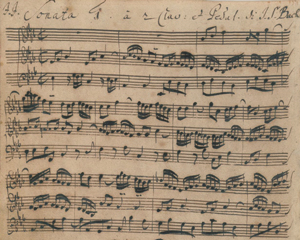by Daniel Hathaway

The program presented contrasting repertory played by three groups of Oberlin Conservatory faculty and guests with only a few duplications of personnel. To open the evening, guests Austin Hartman, violin, and Adriana Contino, cello, joined faculty violist and festival co-chair Michael Strauss in a repurposing of Johann Sebastian Bach’s first organ sonata in E-flat, BWV 525 (manuscript above).
“Repurposing” rather than “arrangement,” for Bach’s clever contrapuntal essay can be read right off the organ score, with violin taking the right hand part, viola the left, and cello the pedal line. So rich are the harmonic implications of the contrapuntal lines that no fill-in chords are necessary.
Hartman, Strauss and Contino wove their intricate lines into a cheerful and expressive web of sound remarkable both for its clarity and level of nuance. Those of us who are used to hearing these sonatas on organ — which gives the first and last movements of this particular sonata an agreeably tooty character — may have had mixed feelings about their translation to a string trio. The more lyrical Adagio lent itself best to this re-instrumentation.
Guest violinist Michelle Abraham and Oberlin faculty Peter Slowik, viola, Darrett Adkins, cello, and Peter Takács, piano, formed the ensemble for Mozart’s Piano Quartet in g, K. 478. Taking a healthy and warmhearted approach to the work, the quartet played masterfully, with exuberance and abundant tone. A bit more Mozartian mischief might have made the final Rondo more characteristic.
After an unlisted pause (the lights came up but nearly everyone stayed in their seats), Hartman and Strauss returned to the stage with their faculty colleague, pianist Monique Duphil, and guests Gulia Guravich, violin and Merry Peckham, cello, for Antonin Dvořák’s irrepressible Piano Quintet No. 2 in A, op. 81.
Op. 81 is a challenge even for groups that play together frequently. Though tonight’s quintet can’t have had time for multiple rehearsals, their assured performance suggested otherwise. There were breathtaking moments of ensemble fireworks (the Scherzo Furiant) and long stretches of intense beauty (the seemingly endless but never boring Dumka). And — note to students — everyone seemed to be having the time of their lives playing together. Peckham’s facial expressions and body language; Hartman’s, Guravich’s and Strauss’s spirited interplay; and Duphil’s savvy and flexible leadership at the keyboard combined into a performance as memorable for its kinetic energy as its splendid musicianship.
Published on ClevelandClassical.com January 12, 2015.
Click here for a printable copy of this article



